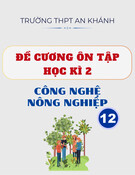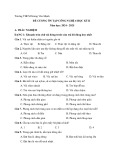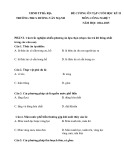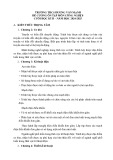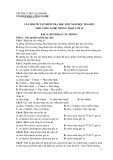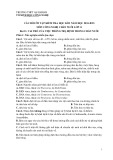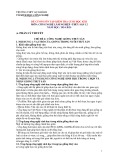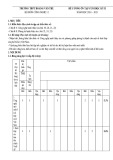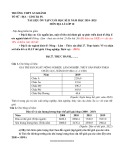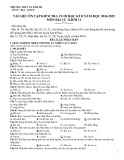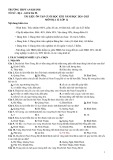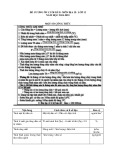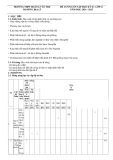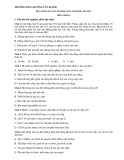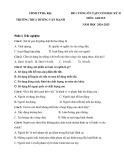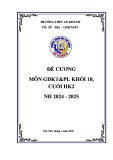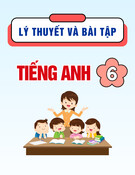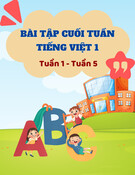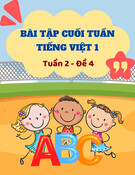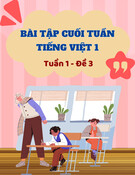
1
TRƯỜNG THPT YÊN HÒA
BỘ MÔN: TIẾNG ANH
ĐỀ CƯƠNG ÔN TẬP HỌC KỲ II - NĂM HỌC 2023 – 2024
MÔN: TIẾNG ANH – KHỐI 12
I. TRỌNG TÂM KIẾN THỨC
Topic
Vocabulary
Grammar
Unit 6
Endangered Species
Words and phrases related to
endangered animals and plants
The future perfect
Double comparatives
Unit 7
Artificial Intelligence
Words and phrases related to
artificial intelligence and
technology
The active and passive causatives
The passive voice
Unit 8
The World of Work
Words and phrases related to the
world of work
Reported speech: reporting orders,
requests, offers, advice, instructions …
Unit 9
Choosing a Career
Words and phrases related to
leaving school and choosing a
career
Phrasal verbs (consisting of a verb, an
adverb, and a preposition)
Adverbial clauses of condition,
comparison, manner, and result
II. BÀI TẬP VẬN DỤNG
UNIT 6: ENDANGERED SPECIES
A. GLOSSARY
WORD
TRANSCRIPTION
COLLOCATIONS
MEANING
1
evolution
/ ˌevəˈluːʃn/
Theory of ~
gradual development of sth
2
habitat
/ ˈhæbɪtæt/
Wildlife/ natural ~
place for animal and plant
3
extinct
/ ɪkˈstɪŋkt /
Become ~
no longer in existence
4
vulnerable
/ ˈvʌlnərəbl /
~ to the flu
easily hurt physically & emotionally
5
environmental
/ ɪnvaɪrənmentl /
~ issues/ groups
connected with the environment
6
Conservation
/ ˌkɒnsəˈveɪʃn /
~ groups/ organisations
the protection of the environment
7
Endangered
/ ɪnˈdeɪndʒə(r) d/
~ species
it may soon no longer exist
8
Essential
/ ɪˈsenʃl /
for sth/ to do sth
necessary
9
(in)adequate
/ ˈædɪkwət /
for sth/ to do sth
Sufficient / səˈfɪʃnt/ = enough
10
Reduce
/ rɪˈdjuːs /
~ the number of + Npl
Make sth less
11
Lessen
/ ˈlesn /
risk/ impact/ effect of sth
reduce
12
verge
/ vɜːdʒ /
On/to the ~ of sth/ doing sth
near to the moment when…
13
brink
/ brɪŋk /
On the ~ of collapse/ war/
death/ disaster
in a new, dangerous situation
14
Wildlife
/ ˈwaɪldlaɪf /
~ habitat/ sanctuary
animals and plants live in natural
environment
15
Wilderness
/ ˈwɪldənəs /
~ area
a large area of land that has never been
developed or used for growing crops
16
reserves
/ rɪˈzɜːv /
Set up nature ~
Protected land
17
fear
/ fɪə(r) /
~ sb/ sth; to do/ doing sth
to be frightened of sb/ sth
18
Frighten
/ ˈfraɪtn /
sb/ sth
make sb suddenly feel afraid
19
Dangerous
/ ˈdeɪndʒərəs /
~ for sb to do sth
injure/ harm/ damage/ destroy sth
20
Survive
/ səˈvaɪv /
~ from disasters/ on $4
Continue to live
21
Evolve
/ iˈvɑːlv /
~ from sth
develop
22
Blend
/ blend/
~ in with sth/ sb
match its surroundings








